Advertisement
Ethan Hawke on his film 'Wildcat' and making a life in the arts

The last time Ethan Hawke came to the Coolidge Corner Theatre, he got a surprise from one of his idols. The four-time Oscar nominee was hosting a Q&A following an opening day screening of “Blaze,” the excellent 2018 film he co-wrote and directed about unsung country music legend Blaze Foley, a personal passion project on which Hawke only half-jokes that he blew his kids’ college fund. After opening up the conversation to questions from the audience, he was startled when the first came from international screen icon Liv Ullmann, star of “Persona” and nine other Ingmar Bergman masterpieces, as well as — unbeknownst to Hawke — a regular patron of the Coolidge.
“First question of the screening, she raised her hand and I was like, ‘Oh my god, that’s Liv Ullmann!’” he marvels. “It turned into one of my favorite screenings of my life. I remember I left the theater and called Richard Linklater and I was like, ‘Guess who just asked me a question? Liv Ullmann!’”
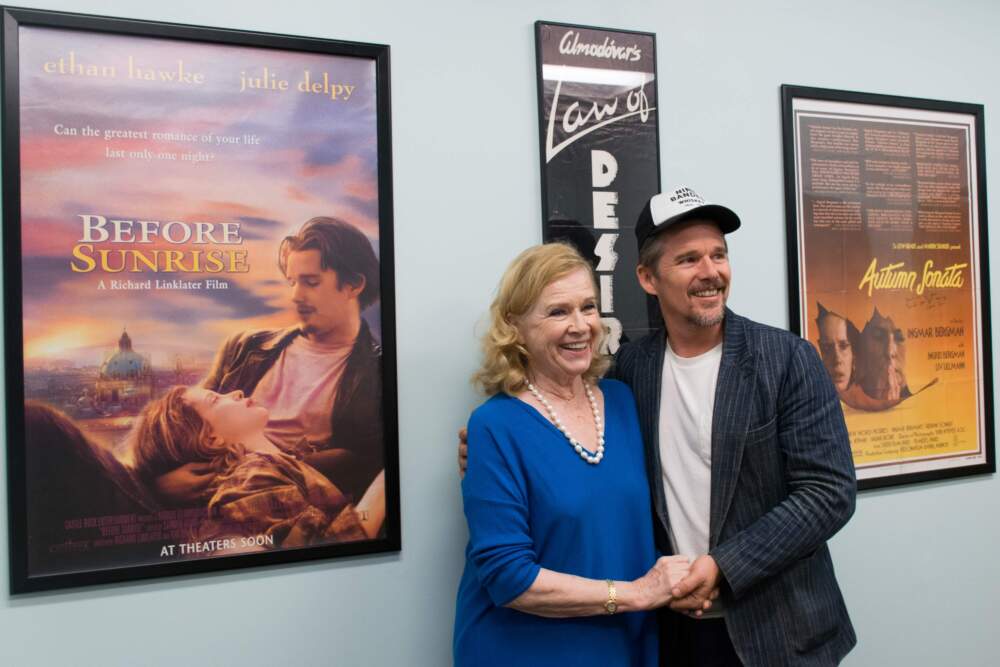
Hawke fell in love with the Coolidge during his visit, and recorded a fundraising promo for the theater while it was closed during the COVID-19 pandemic. In the video, he calls movie theaters his “church of choice,” describing them as “places in America where we go to share stories, to generate empathy, to broaden our views and to be together.”
He’ll be back at the Coolidge on Thursday, May 23 and Friday, May 24 with “Wildcat,” another low-budget labor of love he’s co-written and directed, this one starring his daughter Maya Hawke as writer Flannery O’Connor. The loosey-goosey family affair, produced by the director’s wife and Maya’s stepmother, Ryan Hawke, and co-scripted with musician Shelby Gaines, incorporates expressionistic adaptations of O’Connor’s stories into the narrative of her short, singular life growing up in what the filmmaker calls “the poisonous soil of the Jim Crow South.”
Much in the way that godfather of American indies John Cassavetes used to show up at cinemas carrying the film cans himself, Hawke has been bringing “Wildcat” from theater to theater across the country. Calling on the phone before a screening in Louisville, Kentucky, he sounds exhausted from the road but no less earnest and enthusiastic about the project.
Hawke is an uncommonly thoughtful interview who carries himself with a relaxed, self-effacing humor. (Ever the gentleman, he refers to the subject of his film as “Miss O’Connor.”) It speaks to his temperament that the first thing you notice about “Wildcat” is how much fun everyone seems to be having, with the younger Hawke and co-star Laura Linney tackling multiple roles in the wild, sometimes gleefully grotesque short story dramatizations designed to reflect the author’s fraught relationship with her mother, also played by Linney. Despite its inherent tragedy, the film has an exuberant, “let’s put on a show” energy.
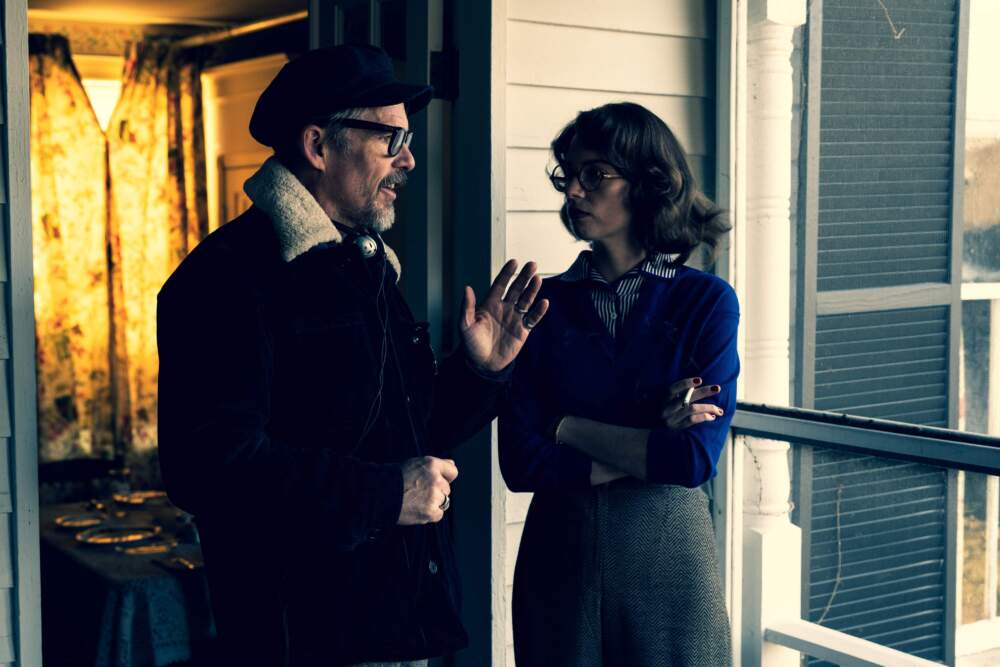
“Hey, if you’re gonna make an independent movie, you might as well have bats--t fun, right?” Hawke says. “I felt a responsibility, obviously, to try to understand the weight of the subject matter that we were tackling. Miss O’Connor was a very serious person. But she seemed to love what she did. And you get the sense from her writing, as upsetting and challenging as it can often be, that there was some wicked joy she was having as she created it. You want to channel that.”
The film begins with a fake black-and-white trailer for a tawdry 1950s melodrama based on O’Connor’s “The Comforts of Home,” with the cast of the movie you’re about to watch cavorting in kitschy costumes and overheated period theatrics, announcing that “Wildcat” will be anything but a conventional biography.
“I wanted to go right out of the gate,” Hawke explains. “We’re not making a biopic. We’re doing something else. We’re going to be as punk and mischievous as she was, or at least we’re going to try to be.”
The project was initiated by his daughter Maya, the 25-year-old musician and breakout “Stranger Things” star who Hawke describes as “good trouble. She’s definitely a force.” He credits Maya’s powerful response to reading O’Connor’s “A Prayer Journal” as what got the ball rolling, as well as her dissatisfaction with the roles Hollywood was offering.
Advertisement
“She grew up with me showing her all these Gene Hackman and Denzel Washington and Dustin Hoffman and Al Pacino movies where men get to play troubled, unlikable people who have a passion for their work, and that passion makes you like them,” he says. “Whereas young women are asked to smile and be nice. She said, ‘I want to play a badass like all these men.’”
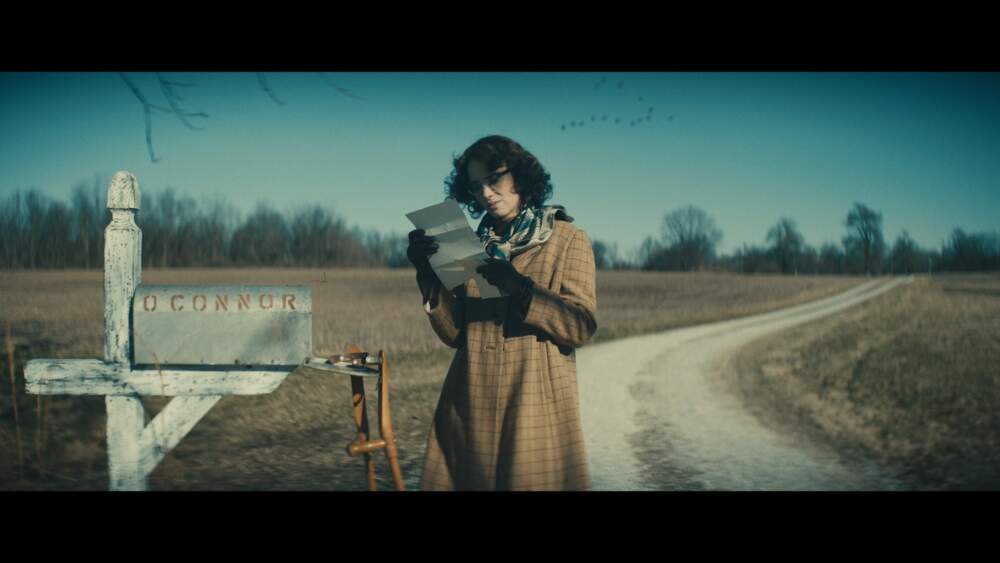
At a time when biopics of superstars like Freddie Mercury and Bob Marley are doing blockbuster business, here’s Hawke making movies about Blaze Foley and Flannery O’Connor. (“I’m clearly aiming for number one at the box office,” he quips.) But both “Wildcat” and “Blaze” are of a piece with Hawke’s other efforts behind the camera, going back to his 2001 feature directorial debut “Chelsea Walls,” an early digital video experiment about struggling artists living in New York’s fabled bastion of bohemia, the Chelsea Hotel. His documentaries “Seymour: An Introduction,” profiling a renowned concert pianist who quit to become a teacher, and “The Last Movie Stars,” Hawke’s dazzling multi-part portrait of Paul Newman and Joanne Woodward, are similarly preoccupied with the question of how to make a meaningful life in the arts.
“That’s kind of the question I’ve been asking myself since I was about 28 or so,” he says. When I suggest he seems to have figured out a pretty good answer, Hawke demurs. “I’m enjoying the conversation. It’s funny that you bring up ‘Chelsea Walls,’ because I was turning 30 around then and it was a really powerful experience to direct Kris Kristofferson at that moment in his life. It was so wonderful to be with someone who had all the battle scars of living this fight, who still believed in it so much that he was willing to do a $100,000 movie for free and pour himself into it entirely. I was so moved by that.”
Kristofferson is clearly a hero to Hawke, who profiled the singer-songwriter for Rolling Stone magazine in 2009. The piece included some instantly infamous anecdotes about how poorly Kristofferson’s outspoken liberal politics went over with the mainstream country establishment, and how little the grizzled iconoclast gave a damn. Hawke directed him again in “Blaze,” telling the Coolidge audience in 2018 that the ailing legend took on the small role of Foley’s father as a chance “to say goodbye.” (This was the first time I ever teared up at a Q&A.)
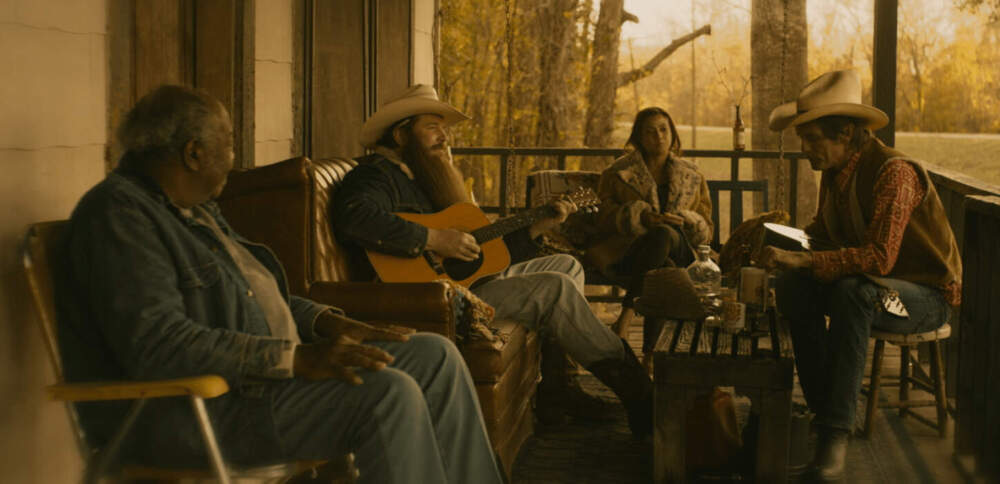
Talking about Kristofferson puts him in a contemplative mood. “We’re here for such a short period of time, and so often we’re asked to think that the point of our life is to accumulate a lot of stuff, or have other people think we’re fabulous, right? As if that’s going to change anything. What I find so moving about Miss O’Connor is that because the reality of mortality hit her so young, she wrote about that mystery better than anyone else.” Considering the connections running through his films, Hawke adds, “It’s not a huge reach to imagine Blaze Foley and Flannery O’Connor walking the halls of the Chelsea Hotel.”
In 2021, Hawke published his third novel, “A Bright Ray of Darkness.” It’s the story of a callow young movie star who gets caught cheating on his superstar pop singer wife, and amid the tabloid frenzy of their divorce tries to find himself again by making his stage debut as Hotspur in Shakespeare’s “Henry IV.” Any overlap with Hawke’s messy split from first wife Uma Thurman and subsequent turn as Hotspur at Lincoln Center in 2003 is obviously entirely intentional, and presumably cathartic. It’s a wickedly funny, self-lacerating book, laying bare the fragile follies of the male ego while also quintessentially Hawke-ish in that it’s about how when things are at their worst, we turn to art to help make sense of our chaotic existence. Hawke read the audiobook himself, a tour de force performance that makes an already personal novel feel more like a confession.
“That was really hard to do,” he sighs, after a considerable pause. “Whenever you’re writing you’re revealing yourself in a very intimate way. You can get a lot of confidence when you’re alone in your room, but then reading it out loud was extremely intense for me.
“But I also loved doing it. I didn’t really feel like I was done with the book until I did that audio,” he says. “I remember leaving that little cubicle and being absolutely exhausted, but also feeling like, ‘well, it’s done.’ That’s what’s kind of wonderful about it. Like shedding a skin or leaves falling. You can be done with it and move forward.”
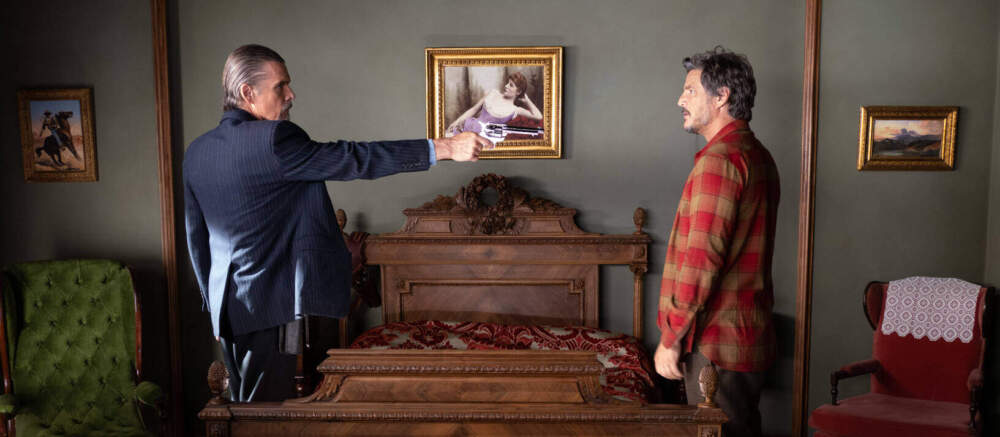
Hakwe has carved out an enviable career moving freely between studio pictures and smaller personal projects. He’s recently been seen as a mask-wearing child murderer in the horror hit “The Black Phone,” played a gay cowboy in Pedro Almodóvar’s “Strange Way of Life” and even popped up alongside his “Dead Poets Society” co-star Josh Charles in the music video for Taylor Swift’s “Fortnight.”
Reminding me again that he spent his children’s tuition money on an independent film and “needs to find another way to pay for college,” Hawke swears his eclectic choices are not by any grand design, but rather, “I feel like a cat. I’m always trying to land on my feet.” Still, not a lot of other actors who do the voice of Batman on a kids’ cartoon (“Batwheels,” now streaming on Max) would run off to Rome right after lockdown to make a low-budget dystopian allegory with madman maverick Abel Ferrara.
That nigh-inscrutable 2021 film, “Zeros and Ones,” stars Hawke in dual roles as an imprisoned, Woody Guthrie-quoting anarchist and as his twin brother, a subservient soldier in a totalitarian regime. It also features home video footage of the actor watching a rough cut for the first time and offering his own interpretations of Ferrara’s cryptic imagery. “Abel asked me to do a video to help him raise money to finish the movie, and then he cut it into the movie. Never asked my permission or anything,” he laughs. “It’s so meta and weird, it’s kind of brilliant. That’s Abel.”
During the 1990s and early 2000s, Hawke seemed to embody a pretentious slacker stereotype that was like an albatross around the necks of Generation X, mostly thanks to his breakout performance as the insufferable Troy Dyer in 1994’s “Reality Bites.” Revisiting that film for a recent 30th anniversary screening at the Coolidge, I reflected on how for years afterward I thought I hated Ethan Hawke, when really I just hated Troy. He’d played the role too well, and it took a long time for me to see past that to what an adventurous actor he’d become. By the time I saw “First Reformed,” I started to feel like I owed him an apology.
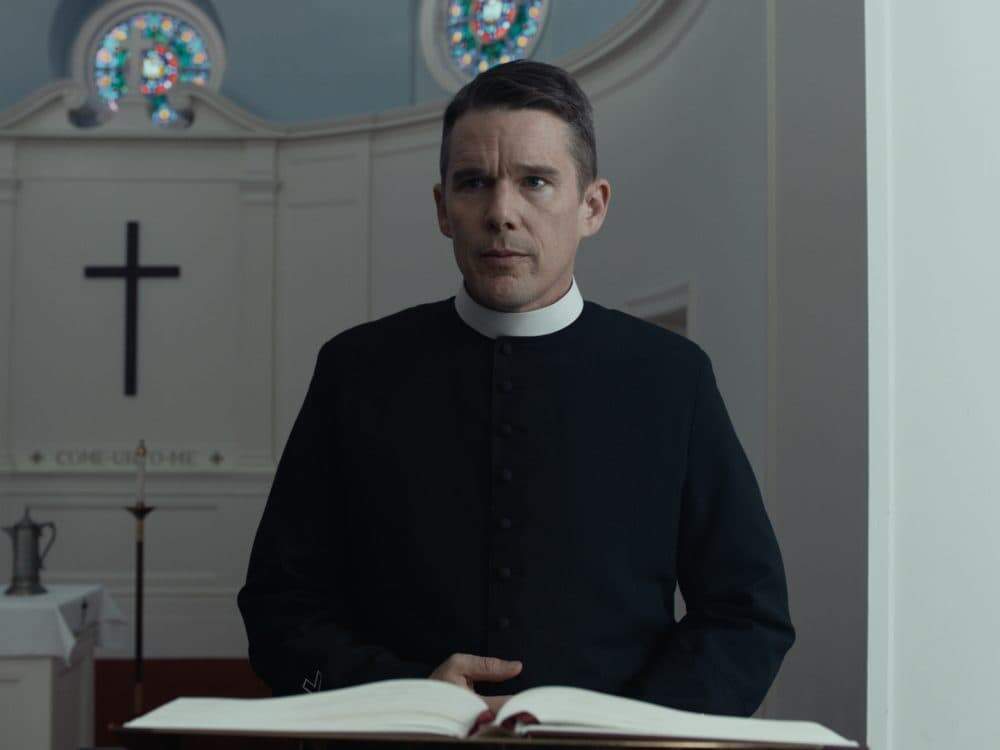
Hawke says he hears that a lot. “I think when people discover you playing a character, they think that character is you. That’s fair, I guess. But it’s also not fair. I would get a lot of animosity after that movie came out. People didn’t like Troy, and they thought they didn’t like me,” he says. “He’s representative of a certain ethos and why people reacted so violently is that we all knew that guy. We knew him and didn’t like him! We were all wrestling either with the Troy in our lives or the Troy in ourselves.”
In other words, apology accepted. I hope. And as for how Hawke feels these days about Troy’s tirades against selling out?
“It’s not wrong to say that I think about my obituary,” Hawke admits. “Since around 'Reality Bites,' I’ve been struggling, trying to figure out how to stay the course, how to have a sense of humor, to realize that you can’t do everything right and to keep bouncing back. There’s a great Cassavetes quote that it’s okay to sell out as long as you know what you’re selling out for. I kind of know what I’m selling out for.”
“Wildcat” opens at the Coolidge Corner Theatre on Thursday, May 23. Ethan Hawke and co-writer Shelby Gaines will be in attendance at the evening shows on Thursday, May 23 and Friday, May 24.
